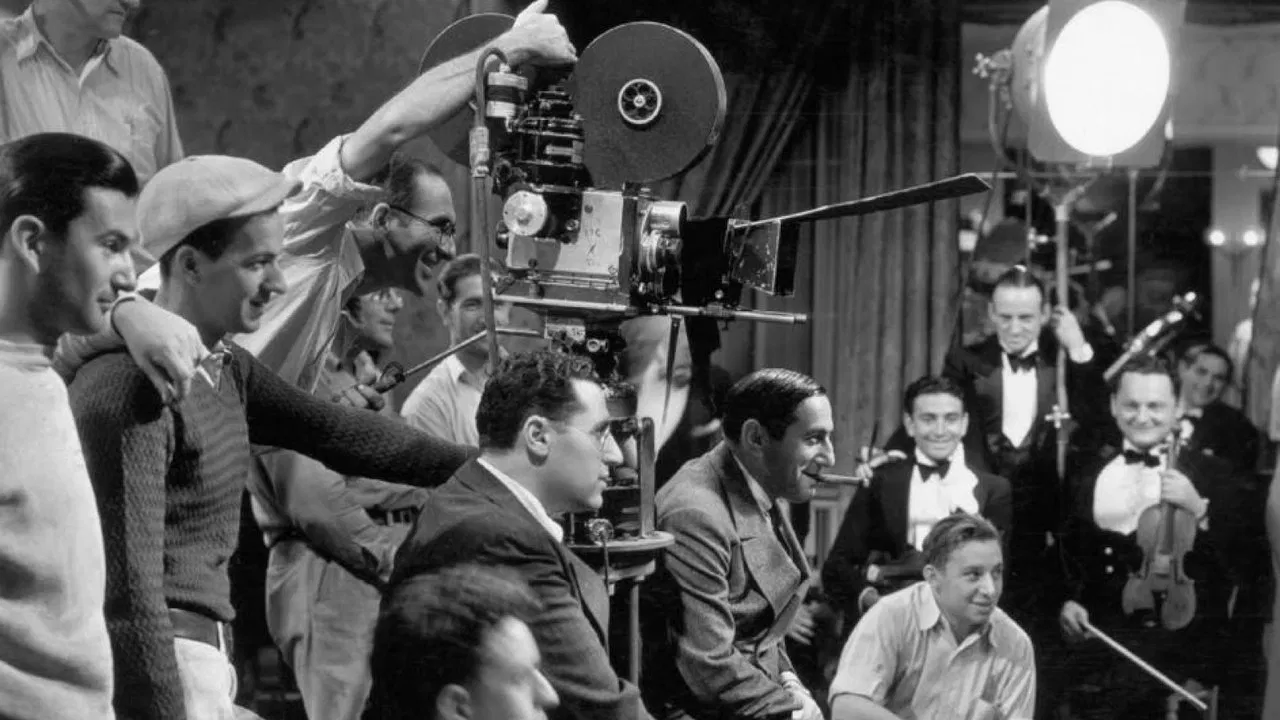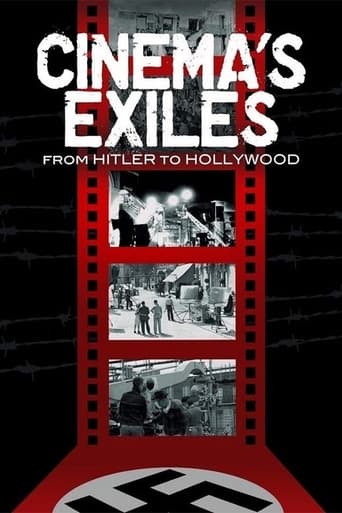


Perfectly adorable
... View MoreA story that's too fascinating to pass by...
... View MoreI enjoyed watching this film and would recommend other to give it a try , (as I am) but this movie, although enjoyable to watch due to the better than average acting fails to add anything new to its storyline that is all too familiar to these types of movies.
... View MoreExactly the movie you think it is, but not the movie you want it to be.
... View MoreMovie actors, directors, studio heads, producers, composers, technicians. So many famous names, even more obscure names, but our cinema would not have been the same without them. The European expressionism of the 1920's and '30s took Hollywood by storm just as Nazism had taken Germany and later a good deal of Europe by storm. The personal experiences of the writers, directors and producers influenced their American works, so through hideous inhumane experiences, these filmmakers created some of the greatest examples of art that cinema has known.With sincere narration by Sigourney Weaver, this documentary shows that art and history intertwined. Many left before the rise of Hitler, while others made it to Hollywood as refugees, most Jewish, some married to Jews, and others simply against the fascism taking over their homeland. It's sad yet at the same time triumphant, because it's about survival. Vintage photos and filmed personal footage, newsreels and movie clips, plus interviews with witnesses who were there. Lupita Tovar Kohner, who just passed away at the age of 106, risked her own safety and tells her side of the story, bringing cash out of Germany to aide her friends who had already left. Marlene Dietrich, already an American star, aided refugees and was branded a German traitor. The documentary shows the rise of the German cinema after their loss of World War I, yet the creators of these classics ended up as targets simply for being Jewish. The influence on post Nazism Hollywood through the triumph of these refugees is then documented, as is how they used their passion for freedom to tell so many classics during the second world war. Lines in the scripts of their films do not deny their hatred of fascism. German actors, once the great stars of screen and cinema there, were not afraid of villainizing the Nazi. Other films using anti-Nazi allegories are explained, enlightening the audience to something they may not have picked up at the time. They do not go into the anti-Semitic backlash of the post year wars, but in 2 hours, there's enough material to give an idea of how these artists made an impact on the films of the time. Made in 2009 70-80 years after this all occurred, this is especially potent today in the changing times the world is facing every day. This is still in the lifetime of many people still living, so there's a lot of important lessons to be had. Cinema entertains, certainly, but it also educates and humanizes an often cruel world. It reminds us through our humanity, creativity and spirituality to never let any single leader in our world dictate who will be top dog in society and who will be degraded and turned over to evil lawmakers to be tortured and killed. They say art imitates life, and with the passion of freedom, life as many had to suffer through will simply remain as pages in a history book.
... View MorePBS usually always makes some fine documentary films, This one is no exception. This film covers the major contribution that people fleeing Nazi Germany made to Hollywood during the 1930's and 1940's and beyond. The film made a lot of excellent choices of film material to be included and wrote an excellent narration script. Sigourney Weaver is an excellent choice to do the narration.Very often this type of production slips under the radar of the public and this one has a lot of information which needed to be documented. I was amazed at some of the obvious home movie material that was chosen to get into this one. It was chosen very well.The focus on the people who had to flee Germany is told with care and carefully. This film gives one a whole new aspect of viewing the movie Casablanca and the irony that went into the casting of the film. The focus here on everyone in the film without focus on Bogart and Bergman gave me a perspective I never had before. To Be Or Not To Be is a film of growing reputation in recent years. This movie is a great choice to talk about this era too. Surprising, the films connected to this subject range a wide array of movies that perfectly illustrate the Nazi's loss by literally forcing these creative people to leave and come to Hollywood to contribute. The names from Fritz Lang, to Peter Lorre, to Billy Wilder, and the ones of lesser fame were major contributors to a lot of quality films in Hollywood history from this era.This film stands on it's own on how an era of desperation produced many people who inspired some of the greatest work in Hollywood during a time it was much needed. An overlooked film from this era does need a documentary of it's own. Unfortunately that amazing film was a one man operation, so without him, no proper documentary can be done.I would state though that viewing that movie would complement viewing this one as the film is a very fitting complement for To Be Or Not To Be, and predates and possibly inspired it.That film? The Great Dictator.While that movie would not make this documentary better, it deserves a special place in the history of films all it's own.
... View MoreThis program was first broadcast on PBS and was shown tonight for the first time on Turner Classic Movies. It's a film about the exodus of German filmmakers and stars as a result of Nazi persecution and their subsequent careers and experiences abroad...particularly in Hollywood. It begins by discussing how powerful and successful the German film company, UFA, was and the various stars who were to become equally famous in America. Then it talks about the experiences many of these folks and other European nationals living in Nazi occupied Europe had in films--some very positive, some not so. In general I really liked the program and thought it nearly perfect. However, a few times the program SAID things which were interesting theories but were presented as established facts...and that bothered me. The film "The Wolf Man" (1941) was, according to this documentary, "an allegory for Hitler and Germany"...and I, stupidly, thought it was about a guy who got bitten by a werewolf and who then became a werewolf! One of the folks interviewed also said that the monster films made during this era "weren't very good"...well, that also smacks of opinion...and one I strongly disagree with because I think they are wonderful films. So, take a bit of what they say in this one...and just enjoy which they get right which is most everything.
... View MoreThe story of the leading talents of the German film industry of the 1920s has been told before. How the writers, composers,directors, actors, producers and cinematographers, (many, if not most, of whom were Jewish) were forced to leave by the rise of Hitler and how their arrival in Hollywood introduced new styles and new ideas to the world's largest movie factories is a part of every American cinema history book.This documentary is different. It covers the participants' individual stories in greater depth. While some exiles achieved fame (Marlene Dietrich, Erich Wolfgang Korngold, Billy Wilder, Franz Waxman) others, such as Joe May and Erich Pommer were less adaptable and thus left their best efforts behind them."Cinema's Exiles" is a visual feast. The film clips are first rate and the home movies are remarkable. There are stills and excerpts and interviews that I had never seen before. The roll call of émigrés from the film "Casablanca" was especially revealing.
... View More